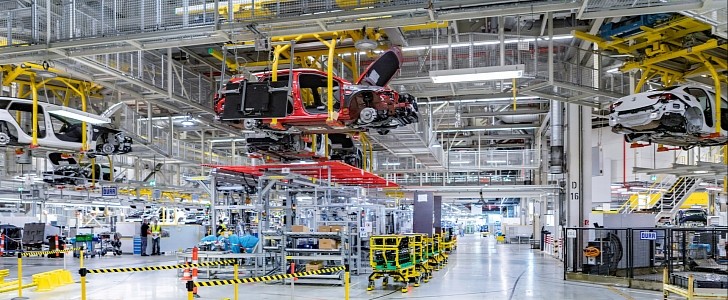Say what you want about the chip shortage, but while some optimistic minds out there hope to see the crisis coming to an end this year, more and more signs seem to suggest this is very, very unlikely to happen.
Stellantis, for instance, has recently confirmed the struggle caused by the lack of semiconductors once again, revealing that two of its manufacturing plants would go offline because there are not enough chips to keep the production running.
Earlier this week, the company idled production at the car plant in Sochaux, France, and today, a labor union confirmed that the temporary shutdown affects a factory in Spain as well.
This time, it’s the Opel plant in Zaragoza, with the production to be suspended between Thursday and Monday. However, it’s not clear if all shifts are scheduled to resume next week or if the factory will continue to run at reduced production power.
As far as the end of the chip shortage is concerned, it all depends on how optimistic you are.
Some of the most positive forecasts out there indicate that the global chip inventory would start improving in late 2022 before coming back to pre-2020 levels at some point next year. In other words, all chip problems would be resolved in 12 months if these forecasts are right.
But on the other hand, tech giants – and these are the companies that we should really trust given they have long been involved in the chip business – believe the struggle would continue for at least two more years. Intel, for instance, has previously estimated that the inventory would remain constrained until at least 2024.
At the opposite pole, there are the most pessimistic forecasts indicating this global issue wouldn’t be resolved until 2026, especially as the crisis is fueled by other problems, such as the shortage of other materials and the rising costs of pretty much everything.
Earlier this week, the company idled production at the car plant in Sochaux, France, and today, a labor union confirmed that the temporary shutdown affects a factory in Spain as well.
This time, it’s the Opel plant in Zaragoza, with the production to be suspended between Thursday and Monday. However, it’s not clear if all shifts are scheduled to resume next week or if the factory will continue to run at reduced production power.
As far as the end of the chip shortage is concerned, it all depends on how optimistic you are.
Some of the most positive forecasts out there indicate that the global chip inventory would start improving in late 2022 before coming back to pre-2020 levels at some point next year. In other words, all chip problems would be resolved in 12 months if these forecasts are right.
But on the other hand, tech giants – and these are the companies that we should really trust given they have long been involved in the chip business – believe the struggle would continue for at least two more years. Intel, for instance, has previously estimated that the inventory would remain constrained until at least 2024.
At the opposite pole, there are the most pessimistic forecasts indicating this global issue wouldn’t be resolved until 2026, especially as the crisis is fueled by other problems, such as the shortage of other materials and the rising costs of pretty much everything.






